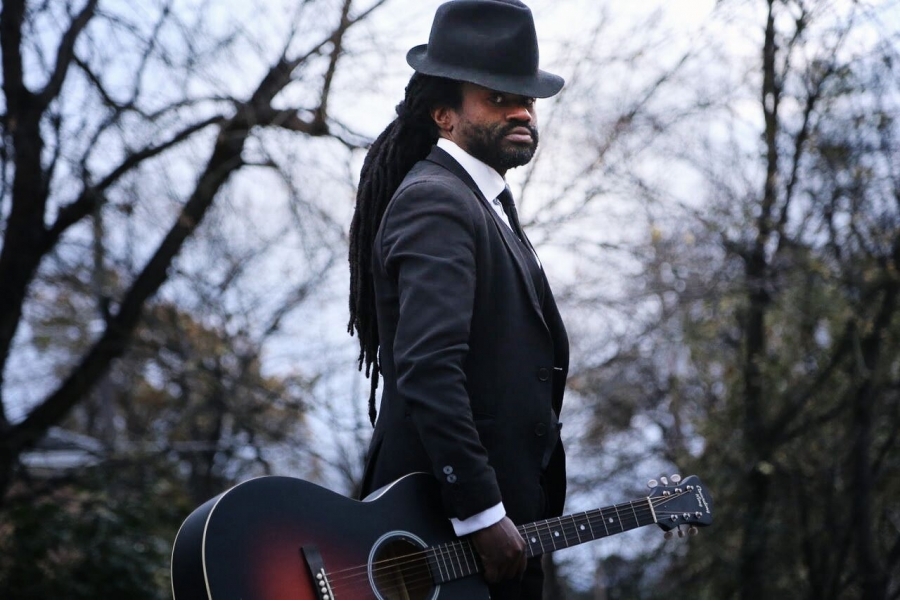When the Prayer for Peace Tour pulls through World Cafe Live May 10, it won’t only toe the line for ancient-to-future-forward-thinking Delta blues and dirty soul courtesy the North Mississippi Allstars and Alvin Youngblood Hart. The night welcomes activist, author, theologian and bluesman the Rev. Osagyefo Uhuru Sekou – Rev. Sekou for short, a child of the black Pentecostal Church of God in Christ – a holy man who, though not gay, calls himself in word and action, “an ally” for all things, people and issues LGBT.
“We are in this together,” he said last week, speaking on behalf of his just-released new album, “In Times like These” with the North Mississippi Allstars, as well as this week’s upcoming Philly show. “I lost the vote for a pastorage in 2009 because congregates and elites opposed my position on gay marriage – a positive one.”
Listening to Sekou’s activist blues – be it the words from “Resist” on his newest album, or 2016’s “The Revolution Has Come” dedicated to Black Lives Matter and the collective black struggle – is a different ordeal from reading his theological essays or stringent talks. The passion is clear, present, dangerous and smart in both cases. His talks, however, are like fireside chats, a man and the Word — a man and his word — speaking with the glory of the Holy Ghost behind him and modern humanist feelings beside him.
His “Religious Dispatches” alone is a repository for forward-thinking in modern theology (http://religiondispatches.org/author/osagyefosekou). Last year, in an essay at Huffington Post, he was quoted as saying “As a queer ally, I am wondering if ‘I took my hand off the plow’ or ‘my eyes off the prize,'” in relation to the struggles of gays and blacks. “By taking a critical position of my church, at times my own community and nation for its discrimination against queer folks, all the while the hard-fought struggles that expanded democratic opportunity are under constant attack.”
In his book, and his talk, “Gods, Gays & Guns: Religion & the Future of American Democracy,” Sekou explores marriage equality, social justice and economic parity with the controversial claim that “Democracy and God have failed” the LGBT community. Hope springs eternal and man can change, but getting there is a struggle according to the good reverend.
Sekou comes by this naturally, but not easily and without hassle. As the grandson of firebrand Pentecostals, “We place an emphasis on calling,” Sekou said, stressing the word dramatically. “Having a calling — how one typically has a divine encounter, one that is decided upon within that community by a trial and a vote; I’m part of a family — it’s the family trade.”
It is clear from what Sekou says about losing a patronage that his love of freedom for all – LGBT in particular – made him an outsider to his own religious community. As part of a Southern family and its traditions, how did his own Pentecostal parents and grandparents take to Sekou’s beliefs?
“My grandfather was married to my grandmother, who was a beast of an organizer,” he said slowly. “She didn’t take no shit. She carried a pistol in her purse and stared down lynch mobs who were coming for her first-born. At that time, patriarchy and misogyny existed. My folks loved me and loved one another even in the midst of those contradictions. For sure, my grandfather and grandmother were homophobic but you could not act rudely or disrespectfully to anyone gay in their presence. If somebody queer came to my grandmother’s house she would make a big deal over them. ‘Come here, baby, you sit here. You eat this special piece of pie that I made just for you.’ They might not have understood and had homophobic tendencies, but they had love. There were manners to how these black rural Southern people operated. They manipulated time and space so to keep track of that respect, other people’s humanity. So, even though my grandfather … say … preached in a demonization that did not allow women to preach, also in the church of God and Christ there is an unwritten episcopacy. Althea Butler from Philadelphia wrote a great book, ‘Pentecostal Women in the Church of God and Christ,’ about that separate episcopacy. For instance, even though when I was ordained the men laid hands on me, so did Mother Quick lay hands on me, and in the presence of the men to show further that I belonged to them. So when you look at their possible homophobia and sexism, there is something more nuanced about the way they engage with humanity. Do they share my theology? No. But that same church and those same leaders taught me to love and love everyone when I was catching hell; out of that framework I came to support a woman’s right to choose and a commitment to recognize and respect all gay, bi and transgender folks.”
For Sekou, there is no great black music without black suffering, a message he said applies to oppressed people all over the world.
“At one level, the task of any artist is to create medicine, to heal the wounds of people to fight another day. That is whatever tradition or holy place one’s music comes from. I stand in solidarity with anyone who has their heart broken.”
The Rev. Sekou, North Mississippi Allstars and Alvin Youngblood Hart perform 8 p.m. May 10 at World Cafe Live, 3025 Walnut St. Tickets are $20-$30; worldcafelive.com.

